The trial of the time frame in indigenous lands will return to the Federal Supreme Court (STF) in June. The President of the Court, Minister Rosa Weber, announced that the measure was scheduled for the 7th of next month.
An action by the Institute for the Environment of the State of Santa Catarina (IMA) is being analyzed against the Xokleng people, who, according to the entity, occupied an indigenous area located in the Biological Reserve of Sassafras, approximately 200 kilometers from Florianópolis, after the date promulgation of the Constitution.
The temporal framework thesis, defended by ruralists, determines that the demarcation of an indigenous land can only happen if it is proven that the indigenous people were in the required space on October 5, 1988 – when the current Constitution was enacted.
The appeal on the temporal framework of indigenous lands has general repercussions. The trial of the subject will allow the resolution of about 82 similar cases that were suspended in other instances of the Brazilian Justice.
In September 2021, while it was being judged by the STF, Minister Alexandre de Moraes asked to see the case – more time for analysis. The return took place in October of the same year.
As early as June 2022, the issue returned to the Supreme Court. However, the then president, Minister Luiz Fux, withdrew the discussion from the agenda.
The scoreboard for the judgment of the timeframe in the STF is tied at 1 to 1. The rapporteur of the case, Minister Edson Fachin, spoke out against the measure. For the magistrate, Article 231 of the Constitution recognizes the right of these peoples to remain regardless of the date of occupation.
Minister Nunes Marques, in turn, voted in favor of the thesis. In his justification, he considered that the interests of the indigenous people do not overlap with the interests of national defense.
House of Representatives Project
The issue of the timeframe was highlighted again not only by the proximity to the return of its analysis in the STF. On Wednesday (24), the plenary of the Chamber of Deputies approved a request to urgently process a bill that could change the system for demarcating indigenous lands.
The urgency allows the text to be analyzed directly in plenary, without having to go through more committees of the House. The project had been approved with amendments by the Agriculture Commission in 2008 and by the Constitution and Justice Commission (CCJ) in 2021. However, it was rejected by the Human Rights Commission in 2009.
The score in the plenary was 324 votes in favor and 131 against, with one abstention. The result was widely celebrated by deputies in favor of the text.
The project has the support of the ruralist group – made up of around 350 parliamentarians. The governing leadership released the deputies from the allied base to vote as they preferred. The federation formed by PT, PCdoB and PV and the one composed by PSOL and Rede instructed their deputies to vote against.
According to the Minister of Indigenous Peoples, Sônia Guajajara, “the time frame is a legislated genocide. A theory that reverses the entire history of Brazil”.
“A bill that violates the Brazilian Constitution. An attack on the rights of indigenous peoples. An attack on our greatest possibility of facing the climate crisis, the ILs [terras indígenas]”, continued Guajajara.
understand the project
In the justification for the project, presented in 2007, the then deputy Homero Pereira states that there is an “offense” to the principle of harmony between the Three Powers, due to the fact that the demarcation of lands is conditioned to the scope of the Executive, through the National Foundation of Indigenous Peoples (Funai), supported by Law nº 6.001/73.
“The competence to demarcate indigenous lands is restricted to the Executive Power, and concentrated in only one administrative unit, with the Legislative and Judiciary Powers being excluded from issues that are so fundamental for the Country”, quotes the project.
“While the National Congress has no decision-making power over issues related to the process, the Judiciary is faced with legal filigrees that inhibit the examination and judgment of these administrative acts, which, in addition to being complex, are peculiar, as they are discretionary”, he justifies.
Therefore, the project aims to amend the said law to comply with constitutional harmony and bring to Congress the debate on issues involving the demarcation of indigenous lands.
“Issues related to the overlapping of areas, environmental protection, borders, national security, mineral exploration and water resources, and many others that are not within the competence of the federal agency that assists indigenous people, must be considered”, he mentions.
“The setting for these debates is the National Congress. Hence, the importance of examining and debating all these issues, within the scope of the National Congress, where the most diverse public and private, collective and individual interests can be widely discussed and analyzed, to, in the end, be approved in the form of the law” , continues.
It is also emphasized that the demarcation by legal means, and not only by administrative means, as is currently done, does not invalidate the procedures carried out by Funai.
*With information from Lucas Mendes and Luciana Amaral, from CNN
Source: CNN Brasil
I’m James Harper, a highly experienced and accomplished news writer for World Stock Market. I have been writing in the Politics section of the website for over five years, providing readers with up-to-date and insightful information about current events in politics. My work is widely read and respected by many industry professionals as well as laymen.







